- Home
- Naguib Mahfouz
Morning and Evening Talk Page 3
Morning and Evening Talk Read online
Page 3
“If she could do anything she would have done it for her son,” said Hussein Qabil.
But Samira did not accept this argument so Radia came with her incense, spells, and incantations. She took the girl around the tombs of the saints and the Prophet’s family but the situation went from bad to worse until only a ghost remained.
One morning, Badriya said to her mother, “I dreamed a prince was summoning me to go for a walk in al-Qanatir.” Samira’s heart was gripped with foreboding. Death came for the girl at noon and she passed away. Thus, Samira lost a daughter just as Matariya had lost a son; but Samira’s had been in the prime of youth. She was surrounded on all sides by condolers from the families of Amr, Surur, Mahmud Bey Ata, Ahmad Bey Ata, and Abd al-Azim Pasha Dawud. How Radia grieved. Whenever she thought about her daughter’s situation she would whisper to her lord, “Have pity, O Merciful and Compassionate.”
Surur Effendi secretly resented Radia. He suspected she was the reason neither of his two daughters were chosen by any of her sons and reviled her in his usual manner. He said to his wife, Zaynab, “It all derives from Radia’s family; all the men and women in it are touched with madness, her first and foremost.”
Baligh Mu‘awiya al-Qalyubi
He was the last of Shaykh Mu‘awiya al-Qalyubi’s children and the brother of Amr Effendi’s wife, Radia. He was born in the shaykh’s house in Suq al-Zalat in Bab al-Sha‘riya, the only infant born to the shaykh after his release from prison. He had a religious upbringing from the outset and his father enrolled him at al-Azhar when he was still young. When he visited his sister Radia in Bayt al-Qadi, his youthfulness, jubbah, caftan, and turban turned heads. He occasioned a mixture of reverence and merriment in her family for by nature he sated both sides, reciting the Qur’an in a fine voice at his sister’s request and joking with her sons and daughters. He had an attractive, round, wheat-colored face and his love of fine cuisine was evident; he knew as much about different kinds of food as he did about the religion he studied.
“You’d be better as a cook than a theologian like your father,” Radia remarked with her biting tongue.
He chuckled, “I’m wavering between a scholastic father and a sister who fraternizes with ifrit.”
Around this time, Shaykh Mu‘awiya departed for the land of his Lord. He arranged Radia’s marriage but did not live to see the wedding. After his death there was no one to curb Baligh’s impulses. One day, Radia and her old mother, Galila, were sitting on the sofa in the hallway, presided over by the stove with the well to its left. Radia could tell from her mother’s somber manner that she was immersed in a sea of worry that was unusual for her. When she asked what was wrong, her mother replied, “Would you believe it, Radia? Your brother has begun coming home each night in a drunken stupor!”
“God forbid!” cried Radia, alarmed.
“I’m powerless.”
Radia found herself even more powerless than her mother. She turned to Amr Effendi for help, but Baligh only feigned remorse and continued his wayward behavior. He provoked general disapproval and increasing indignation all round. Reports eventually reached the Azhar administration and the affair ended with him dismissed and disbarred before obtaining his religious diploma. He found himself lost, without a source of income. His mother owned some vacant land and ceded it to him. He sold it and decided to invest the proceeds in a wholesale grocery business. He traveled to his father’s relatives in Qalyub and began purchasing cheese and butter and transporting it back to Cairo to distribute to grocers. With the outbreak of the First World War he made notable profits and his finances improved. From then on his star rose brightly. Around this time he married Amina al-Fangari, who came from a wealthy and respected family. With the Second World War his fortune reached its zenith. He erected apartment blocks and built a mansion for himself in al-Qabisi, which became known in the quarter as “The Abdin of al-Qabisi” on account of its majesty and splendor. He only produced one son, whom he envisaged as a senior judge. He proved to be a skilled merchant, yet all his life he never recovered from the malady for which he had been expelled from al-Azhar. He would visit Bayt al-Qadi from time to time in a carriage, and later a car, laden with gifts, secretly watching the impression he made with boundless pleasure. He continued to pray and fast and give alms as much as he drank and was as persistent in seeking forgiveness as he was conceited and proud. He lived to the beginning of the 1950s, after Ahmad Ata, Amr, Surur, Mahmud Ata, his mother, Galila, and sisters, Shahira and Sadiqa, had passed away, and when only his older sister Radia, the one who fraternized with ifrit, remained. He developed cirrhosis of the liver, spent half a year in his comfortable bed, and then died in his sleep—or so it appeared to his wife, Amina al-Fangari.
Bahiga Surur Aziz
The square of Bayt al-Qadi witnessed her childhood games with her brother Labib and sister Gamila. While growing up she mixed with her uncle Amr’s sons and daughters. She shared the calm temperament of her older brother, Labib, and cousin Samira, and was the same age as her cousin Qasim. Her face was white and radiant like her mother Sitt Zaynab’s, glowing and rosy. Her eyes were a clear green and there was in her voice a richness that recalled her father, Surur Effendi. Her natural composure meant that some mistook her as dull, whereas her respect for tradition and piety prevented her from misbehaving like other children. Like her uncle’s daughters and her sister, Gamila, her education ended with Qur’an school, and, like them too, she applied herself to cooking, sewing, and other household chores and assumed her place in the customary queue for a suitable man when still very young. Her cousin Hamid was probably the most suitable one in the family, but Ata al-Murakibi’s family seized him for themselves, sounding alarm bells for Surur Effendi and his wife, Zaynab Hanem. They had been through a similar experience once before when hoping to marry Gamila to Amer.
“Didn’t you think of Bahiga before you gave Hamid to Mahmud al-Murakibi?” Surur asked his brother.
“We are poor men at God’s door, Surur. We have to examine our birds to find their feathers! Your daughter Gamila, praise God, will not wait long,” Amr replied.
Surur’s feelings toward his older brother and the rest of the family thus alternated between love and bitterness. He unleashed his tongue on his relatives like a merciless dagger, which ultimately lowered his ranking in their affections below that of his brother, Amr. The futile platitudes Amr offered a second time round exasperated Zaynab. She retained her outward cool but nevertheless announced bitterly, “I know what is behind all this!”
“My brother is deeply conscious of his lowly place before our wealthy relatives,” said Surur. “He is always eager to strengthen his ties with the family’s richer branches.”
“Don’t forget either that Radia, ally of the jinn and black magic, is jealous of me and sparing with her kindness.”
Bahiga was unconcerned by the loss of Hamid—she disliked his coarseness and vulgar manner anyway. At the same time, she observed with disgust the scandalous mischief her sister, Gamila, was carrying on with her cousin Qasim. Her sister was sixteen years old and her cousin was twelve, or perhaps a little over. What was it she sometimes caught them doing on the roof and under the stairs? Good morals repelled it and religion cautioned against it. But she kept it secret for fear of the consequences. Then, after Gamila was engaged to be married and had become sensible, she found it was her turn to think about Qasim. However, she was not reckless and foolish like her sister. Her heart beat with tender love, locked in a cage behind steel bars of shame and tradition. The boy noticed her and read the silent summons in her clear eyes. He complied, overflowing with desire and hoping to continue with her the games interrupted by Gamila’s disappearance. He found a loving heart, but an iron will. He hovered around her like a madman until her mother declared, “You’re the same age so he is not right for you.”
She did not protest, but nor did she agree.
“He has a long way ahead of him. Don’t forget his mother,” Sitt Zaynab continued.
> Bahiga felt wretched. When the young man suffered his tragedy and was presumed lost she was completely drowned in misery. She had no choice but to resume her place in the queue for a suitable man. But the wait stretched out inexplicably until tongues in the family consigned her to the same basket as her aunt Rashwana’s daughter, Dananir. She was a pretty girl and a paragon of good morals so what kept the suitors away? The waiting and heartache dragged on and on until her uncle Amr, her father, Surur, and her mother, Zaynab, had all passed away.
In 1941 she was alone in the old house next door to her uncle’s in Bayt al-Qadi with only the maid, Umm Sayyid. Her brother Labib‘s work kept him away from Cairo and he would only visit as a guest. Despair gnawed away at her night and day as she approached thirty; she had nothing in the world except a share of her father’s pension. Then suddenly—as if by revelation—Shaykh Qasim awoke to her once more and said to his mother, “I want to marry Bahiga!” Radia interpreted the request as a miracle, a decree sent down from the clouds. She spoke to Labib about it the next time he visited. The man thought for a long time. His cousin was not short of money but …? He put the question to his sister and met with consent. Was it despair? Was it the love from long ago? Was it fear of loneliness? The marriage the family had long joked about took place one night as Cairo suffered a major air raid and convulsed with the sound of antiaircraft fire. Bahiga moved to her uncle’s house as Qasim decreed he would not leave home. Years went by, but there was no sign of children.
“You will give birth to a boy when the moon is content,” Qasim assured her.
In 1945 she gave birth to a son, who his father named al-Naqshabandi. He started school after the July Revolution and drank of splendor and glory throughout his education. He was blessed with a radiant face, slender body, and shining intellect. He graduated as an engineer in 1967 and was sent on a delegation. Radia was in her final days when she said goodbye. His father said to him, “God is with you. I bid you farewell without tears.” Al-Naqshabandi traveled to West Germany a few months after June 5, crestfallen and somber. He learned there of the death of the leader, but did not mourn. When he obtained his doctorate he decided against ever returning to Egypt. He worked in Germany, married a German, and took up German nationality. When his father learned of this he said once more, “God is with you. I bid you farewell without tears.”
After Radia died, Qasim and Bahiga remained in the old house behind the walnut tree that had witnessed their love long ago. Their hearts still beat with love and solitude.
Galila Mursi al-Tarabishi
SHE WAS BORN A QUARTER OF THE WAY through the nineteenth century in Bab al-Sha‘riya to a father who worked in a tarboosh factory that was set up, along with other factories, by Muhammad Ali. Her father was a relative of Shaykh al-Qalyubi and lived near his house in Suq al-Zalat, so he betrothed his daughter, Galila, to his neighbor’s son, Shaykh Mu‘awiya, who at that time was starting out as a novice teacher at al-Azhar. Thus, Galila became mistress of the old house in Suq al-Zalat and was known about the quarter as Galila al-Tarabishi. She was so tall she towered over the shaykh, for which he never forgave her. She was dark skinned, slim, had a high forehead and wide brown eyes. With the passing years, she gave birth to Radia, Shahira, Sadiqa, and Baligh. She was renowned for her encyclopedic knowledge of mysteries, miracles, and popular remedies; it was as though she had taken something from every religion from the time of the pharaohs to the Middle Ages. Shaykh Mu‘awiya tried his best to teach her the principles of Islam but through their many years together he took from her more than he gave. He obeyed her when he was sick and, when a mishap befell him, would bow his head for her magic spells, surrender to her incense, and repeat incantations after her. She was stubborn and, if the need arose, aggressive, hence the neighbors were extremely careful around her. She imparted all her knowledge and experience to her daughters and they responded to her variously. Radia embraced her bequest more wholeheartedly than the others and claimed more of her love than the other children, including Baligh.
Whenever Shaykh Mu‘awiya tried to assert authority over her she would defy him stubbornly; even the threat of divorce did not frighten her. He was aware of her moral strength and superior domestic skills so would back off and be content with armistice and co-partnership. She was utterly dedicated and rigid in her beliefs and this was made plain the day her husband, Shaykh Mu‘awiya, died during the Occupation. The engagement of Radia and Amr had been announced according to an agreement reached between Shaykh Mu‘awiya and his friend Aziz Yazid, Amr’s father. An hour after his death, as Sitt Galila’s cries broadcast the bad news, the bride’s hamper arrived, the most important gift from the bridegroom, who did not know what had happened. Galila accepted the gift—a fish the size of her son Baligh—and gave the carrier his portion. Its arrival in the middle of the loud sobbing made her uneasy and she feared the consequences for her favorite daughter’s future. She leaned over the shaykh’s head, shrouded in a green wrap, and whispered from her wounded heart, “Forgive me, Mu‘awiya.” Then she hurried to a room on the eastern side of the house which looked out to the mosque of Sidi al-Sha‘rani in the distance, telling herself, “Bad luck will strike if the gift is not received in the proper way.” She dried her tears, stood behind the window and let a high-pitched ululation burst forth, dancing to melodies of effusive joy. She hurried back to the room where the body was laid out and resumed wailing from the bottom of her heart. The affair reached the ears of some sly women and they whispered to one another and joked about it all Galila’s life. It was passed around as a living testimony to the eccentricities of the controversial woman, who combined piety, love, and madness.
The death of her husband affected her sturdy constitution like nothing else. She mourned him with every ounce of her being and extolled his glorious deeds, real and imagined, for the rest of her long life. And she lived to 110! She lived through Muhammad Ali, Ibrahim, Abbas, Sa‘id, Ismail, Tawfiq, the Urabi Revolution, and the 1919 Revolution. But no event lodged itself in her heart like the Urabi Revolution, which had counted her husband among its leading men. She would often relate his heroic exploits and imprisonment to her grandchildren, her imagination going to such lengths as to make Radia’s sons and daughters believe it was Shaykh Mu‘awiya who Arabized Muhammad Ali and upon whom Urabi had depended after God. The picture of Urabi in her mind became mixed with Antara, Hilal, and the family of the Prophet while honoring above all the memory of Shaykh Mu‘awiya.
Of her children, only Radia and her sons and daughters brought her joy. She was pleased with Amr, although she only visited Bayt al-Qadi a few times, owing to old age. As for Shahira, Sadiqa, and Baligh, a wound that never healed settled in her heart. She would moan at Baligh as he lay drunk on the sofa in the hallway, “You’re a drunk, a sinner, and disgrace to your noble clothes.”
When his tree burst into leaf and he became an important merchant she said to him, “God has given you wealth to test you. Be careful.”
Baligh loved her, but suspected she was not entirely sound in the head. Shahira had by this time returned to the family house as an outcast and filled it with cats, whereas Sadiqa … alas! What grief she suffered!
Qasim was Galila’s favorite grandchild. He would cover her with kisses and listen to her stories, trusting in her with his heart and senses. When what befell him came to pass she was not worried but said to Radia, “Rejoice. God has given you a saint.”
In the last five years of her life, toward the end of the first quarter of the twentieth century—at the beginning of the 1930s—she finally succumbed to old age. Her window to the world was obstructed by the loss of both her sight and hearing, yet she remained alert and would recognize her loved ones by touch. Shahira looked after her as much as she could until she tired of it; she had more compassion for her cats than for her mother. She would complain about her to Radia whenever she visited, so Radia took turns with her sister and reminded her of the Prophet’s bequest to mothers. “It’s easy to preach. You live ve
nerated in your house and leave me on my own to carry out the bequest!” said Shahira.
On one of her visits, Radia found the hallway teeming with cats, mewing and running about wildly, warning that something was amiss. She discovered Galila lying lifeless on the sofa. Shahira was asleep upstairs.
Gamila Surur Aziz
Bayt al-Qadi Square and its trees weighed down with pasha’s beard flowers had never seen anyone more beautiful, except perhaps Amr’s daughter, Matariya. She borrowed her ivory complexion and wide green eyes from her mother, but had a prettier clove-shaped mouth and a better figure. In contrast to her mother, she surged with vitality and levity and derived the fieriness that tinged her cheeks with pink from her father. She was ahead of her time, not in terms of education, for like her sisters and female cousins her share only went as far as obliterating illiteracy, but in the impulsive, uninhibited behavior her premature maturity and dark yearnings unleashed in her. She would linger at the window watering the flowerpots, strut about the area between her house and her uncle’s next door in the half veil, and meet hungry glances with rebellious coquetry. As a child, she wandered about the square with her older brother, Labib, and as the years passed Qasim joined them. She was a few years older than Qasim, but as she approached adolescence he was the only one around for her eager heart to toy with. Whenever they were alone together she would play with him to arouse him out of his innocence, and he would comply, confused, intoxicated, and delighted, as though seeing the beauty of dawn for the first time. His twitching fingertips touched jewels, ignorant of their value. He was not yet thirteen when he prematurely fell upon the honey. He opened up to her soft hand, dyed with henna like a rose, and inclined amiably to the effusions of her burning breast. The frivolity set her brother Amir against her. He berated her until she wept in frustration.

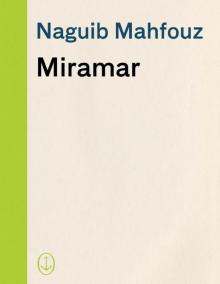 Miramar
Miramar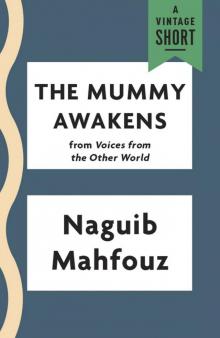 The Mummy Awakens
The Mummy Awakens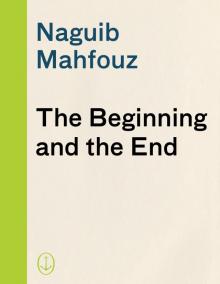 The Beginning and the End
The Beginning and the End Respected Sir, Wedding Song, the Search
Respected Sir, Wedding Song, the Search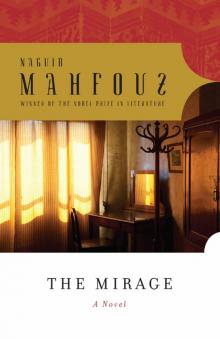 The Mirage
The Mirage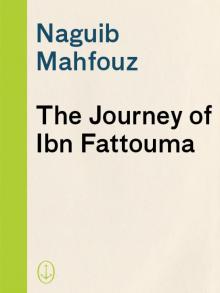 Novels by Naguib Mahfouz
Novels by Naguib Mahfouz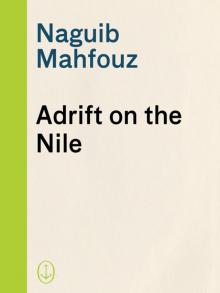 Adrift on the Nile
Adrift on the Nile Karnak Café
Karnak Café Heart of the Night
Heart of the Night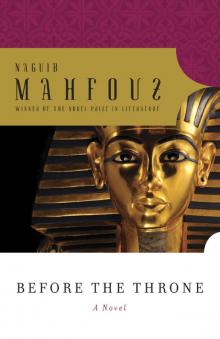 Before the Throne
Before the Throne The Time and the Place: And Other Stories
The Time and the Place: And Other Stories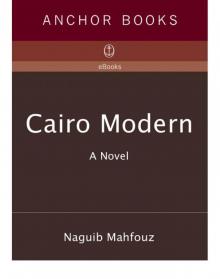 Cairo Modern
Cairo Modern Arabian Nights and Days
Arabian Nights and Days The Day the Leader Was Killed
The Day the Leader Was Killed Morning and Evening Talk
Morning and Evening Talk Three Novels of Ancient Egypt Khufu's Wisdom
Three Novels of Ancient Egypt Khufu's Wisdom Akhenaten: Dweller in Truth
Akhenaten: Dweller in Truth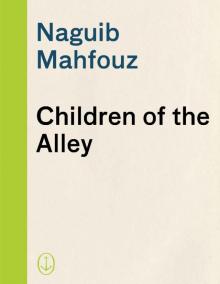 Children of the Alley
Children of the Alley Voices From the Other World
Voices From the Other World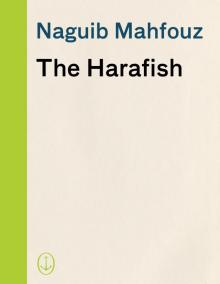 The Harafish
The Harafish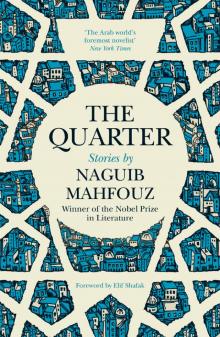 The Quarter
The Quarter The Seventh Heaven: Supernatural Tales
The Seventh Heaven: Supernatural Tales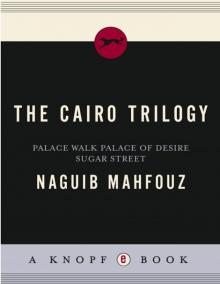 The Cairo Trilogy: Palace Walk, Palace of Desire, Sugar Street
The Cairo Trilogy: Palace Walk, Palace of Desire, Sugar Street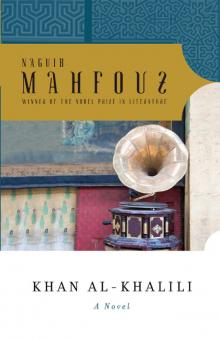 Khan Al-Khalili
Khan Al-Khalili Three Novels of Ancient Egypt Khufu's Wisdom, Rhadopis of Nubia, Thebes at War
Three Novels of Ancient Egypt Khufu's Wisdom, Rhadopis of Nubia, Thebes at War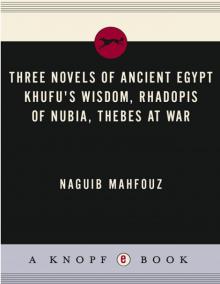 Three Novels of Ancient Egypt
Three Novels of Ancient Egypt The Time and the Place
The Time and the Place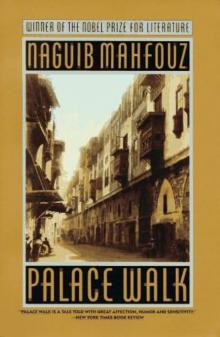 Palace Walk tct-1
Palace Walk tct-1 Akhenaten
Akhenaten The Seventh Heaven
The Seventh Heaven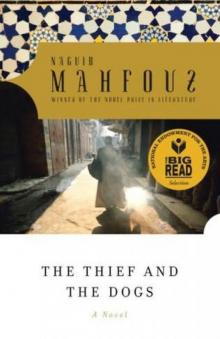 The Thief and the Dogs
The Thief and the Dogs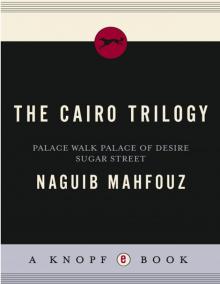 The Cairo Trilogy
The Cairo Trilogy Sugar Street tct-3
Sugar Street tct-3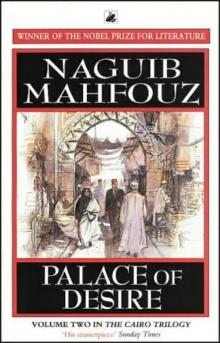 Palace of Desire tct-2
Palace of Desire tct-2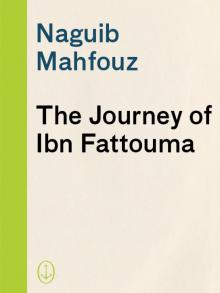 The Journey of Ibn Fattouma
The Journey of Ibn Fattouma